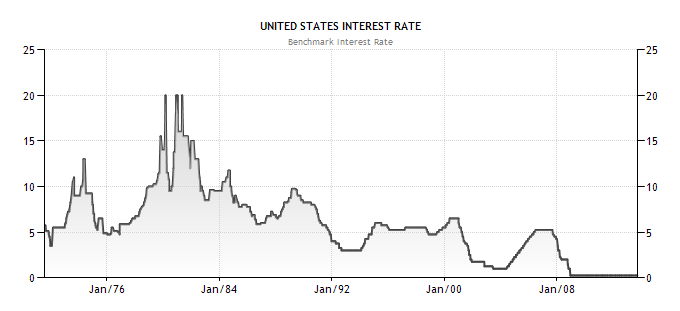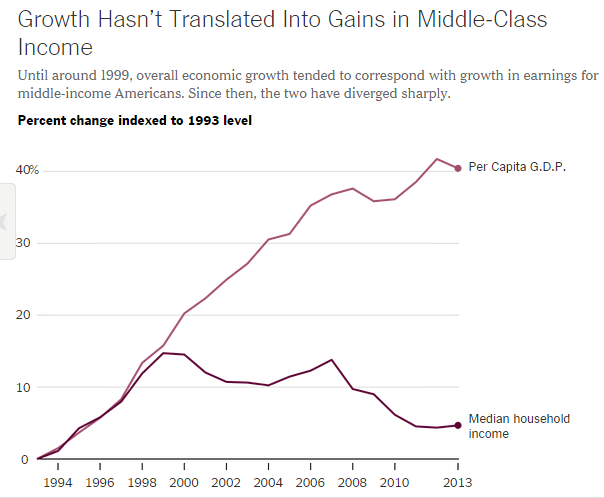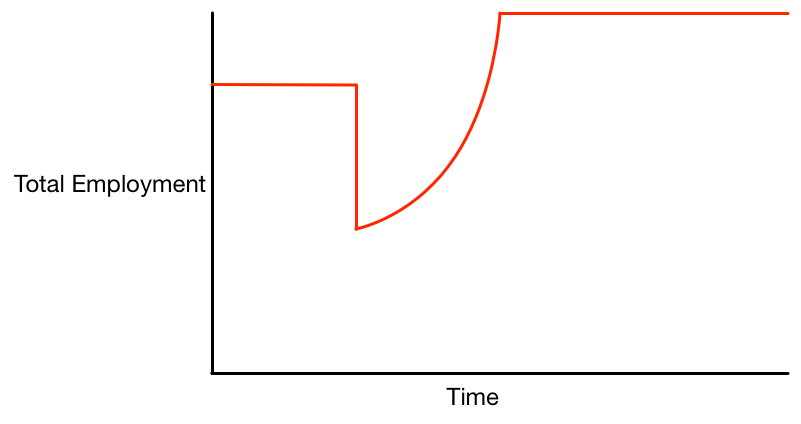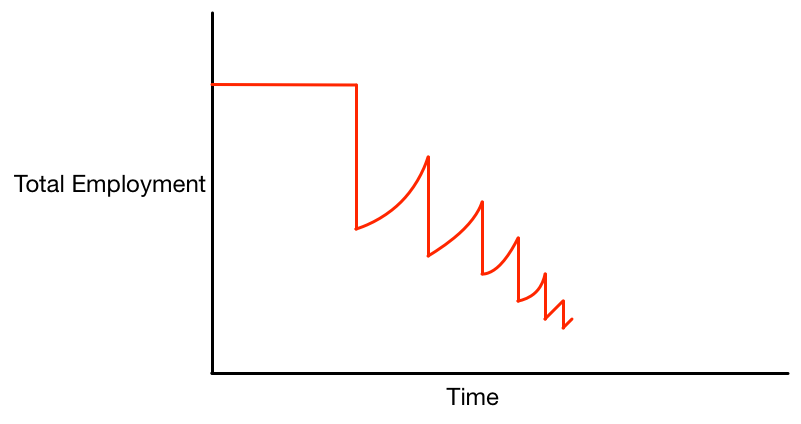We are at the cusp of a fundamental change in our economic system.
For the entirety of human history, and even today for billions of people, the goal of all human efforts was to obtain the fundamental requirements of human survival and procreation: food, clothing, and shelter. As human wealth increased, people expanded their goals: tasty food, pretty clothing, a nice house. But in the rich countries, we are now reaching a point of saturation.
Americans have so much stuff that they have to stuff it into self-storage facilities: 46,000 separate structures containing over 2 billion square feet of storage space. Even though the average American home has doubled in area in the last 50 years — to 2,300 square feet — people don’t have enough space for all the stuff that they have purchased. Real per capita income has doubled in the last 50 years. The average American buys one new article of clothing every 5.5 days. Because of globalization, the prices of goods have tumbled in the last 20 years.
As an old fogey, I can certainly testify to the changes. Nowadays, most teenagers have ready access to a car, or even their own car. That was almost unheard of when I was a teenager. Every teenager has a phone — in my day, there was one telephone for the whole family. Every teenager has a computer — back then, the really determined kids had a slide rule. (I’ll bet many readers won’t even know what a slide rule is.) Typewriters were rare and certainly not within the reach of teenagers; we wrote everything longhand. Teenagers now use printers. I can go on and on with this old-fogey bitching, but the point is clear: teenagers have it a great deal better than we old fogeys did.
This essay is not a paean to capitalism — it is in fact an attack on one of its most important traits: the accumulation of wealth. Our world is now divided into, very roughly speaking, four basic classes:
The rich: these people have so much wealth that they don’t know what to spend it on, so they invest it.
The middle class: these people have most of the stuff they want, but not much investment.
The poor: these people struggle to acquire the minimal attributes of modern life: a refrigerator, a TV, a car.
The extremely poor: these people can’t even get much in the way of food, clothing, and shelter.
The story of human progress can be summarized in three histograms showing the percentage of the population in each of these categories:
These bars are not meant to be accurate; the only point they make is that the distribution of wealth in humanity has shifted dramatically. Whereas once upon a time, most people were desperately poor, in the developed world, the middle class dominates, but there are still lots of fairly poor people ,(mostly the young) and a lot more rich people.
If the world ends up looking like the rightmost histogram, then our economies will collapse. To understand why, you must examine another histogram showing the distribution of wealth in developed countries:
Again, these bars do not precisely represent the distribution of wealth; their purpose is only to show the relationships. The rich own the great majority of the wealth.
Most people look at this histogram and complain that it reflects the unfairness of our economic system. I’ll return to that point later, arguing that the perception of unfairness is more important than the question of unfairness. What really matters in this graph is that the rich don’t have anything to buy. There are only so many private jets, superyachts, and Picassos that you can own. The only thing they can do with their money is invest it.
Most people labor under the misperception that investment is good for the economy. That’s a vague, hand-waving way of thinking about it. Fortunately, the free market can tell us much more accurately how valuable investment is: the interest rate. When people and companies desperately need capital for growth, the interest rate is high. When people and companies don’t see any need to buy more stuff or build new factories, the interest rate is low. Here’s a graph of the interest rate charged by the Federal Reserve Bank; this is the basis for all other interest rates:

The important point here is that the Federal Reserve interest rate has been just a touch above zero for the last nine years. That tells us how valuable capital is: it’s worth almost nothing. That’s because we have billions and billions of dollars desperately looking for somebody to spend them — and nobody wants them.
What we have here is an oversupply of capital and an undersupply of demand. I realize that the phrase “undersupply of demand” seems oxymoronic, but in fact, the most fundamental law of economics is that the price of something increases with the demand for it, and decreases with the supply of it. The fact that price of capital is now at historic lows tells us that the demand for capital is at historic lows.
Most of the demand for capital comes from businesses wanting to expand. Let’s take Apple as an example. It is currently earning huge profits. It is sitting on a quarter of a trillion dollars of cash. It is not using that money to expand production of any of its products. That’s because there is no increase in demand for its products. If it were to manufacture more iPhones and iMacs, they’d sit unsold in warehouses.
All over the economy, companies are finding the same situation. Demand for stuff is not growing. So nobody wants to borrow money to expand. Hence the low interest rates.
So, why isn’t demand growing? Why aren’t consumers rushing out to buy the latest in electronics, fashion, or software? Have consumers lost interest in material possessions? Hardly. The average American spends 97.3% of his net income, reserving only 2.7% for savings. That’s a dangerously low savings rate, but more important is the fact that the average American CAN’T spend any more money — he’s tapped out.
The solution becomes obvious once you realize another fundamental economic law: poor people spend every penny they have, and rich people save most of the pennies they have. To put it another way, the more money you have, the more of it you invest. Conversely, the less money you have, the more of it you spend.
So, if we have too much savings and not enough spending, then any idiot can see the solution: transfer wealth from the rich to the poor. That will boost spending, which will cause the economy to expand, forcing interest rates upward until we get interest rates more like the historical norm: between 5% and 10%.
I will not argue the inverse of the voodoo economics claim that lowering taxes generates more investment which drives more growth which increases tax receipts. That never worked, and I very much doubt that wealth redistribution will make rich people even richer. But it will soften blow a bit.
Instead, I will argue that every economy needs a balance between supply of and demand for capital. Our economy suffers from a wild imbalance. When interest rates hit 20% in the early 1980s, it indicated serious problems with the economy. Now that interest rates are near zero, that too indicates serious problems in our economy. We desperately need to rebalance the economy. And the fastest way to do that is to take money away from rich people and give it to poor people.
Why bother?
At this point, a rich person would probably argue that there’s no need to take such drastic action. After all, he’s quite happy with the current situation and is willing to suffer the consequences of low interest rates. After all, it’s better to earn only a little money on your wealth than to not have the wealth in the first place.
That’s a reasonable argument, but it’s obviously quite selfish. And, of course, so is the poor man’s argument that he needs the money for food, clothing, and shelter. I do not subscribe to the leftist view that everybody has a right to a certain level of economic well-being. My argument is more subtle but, I think, more powerful. I claim that such a redistribution scheme is necessary for societal health.
I begin with one of the most eloquent of Will Durant’s many eloquent comments:
Since practical ability differs from person to person, the majority of such abilities in nearly all societies, is gathered in a minority of men. The concentration of wealth is a natural result of this concentration of ability, and regularly recurs in history. The rate of concentration varies (other factors being equal) with the economic freedom permitted by morals and the laws. Despotism may for a time retard the concentration; democracy, allowing the most liberty, accelerates it... In progressive societies the concentration may reach a point where the strength in number of the many poor rivals the strength of ability in the few rich; then the unstable equilibrium generates a critical situation, which history has diversely met by legislation redistributing wealth or revolution redistributing poverty.
This is not some bleeding-heart sentiment: it is a historical fact. Throughout history, we have seen over and over the concentration of wealth leading to societal collapse. Conversely, we have seen the greatest and/or most powerful nations arise in conditions of economic equality. Athens after Solon, early Rome, the Macedonians under Alexander, the Vikings, the Mongol armies under Ghengis Khan, the French after the Revolution — all these societies enjoyed a burst of enthusiasm and energy due to the egalitarian conditions they created. The Arabic historian Ibn Khaldun called it asabiyah, the energy of egalitarianism. It is one of the fundamental laws of history.
It is no accident: the expectation of equality is built right into our genes. Since long before Homo Sapiens arose, simians have believed in a notion of “fair play”. If you don’t believe me, watch this video of two Capuchin monkeys receiving different rewards for the same work:
The experiment has been repeated with other species: dogs, chimpanzees, birds, and the results are always the same. The expectation of fair treatment is burned right into our genes.
We expect that two people working equally hard and equally intelligently should receive equal rewards. So let’s compare Donald Trump with the average American with a 4-year college degree. Mr. Trump is estimated to have a net worth of about $3 billion. The median net worth of Americans older than 70 years is about $200,000. Let’s say that the average American college graduate who is over 70 has a net worth of $300,000. Thus, Mr. Trump’s net worth is 1,000 times greater than that of his peers. Is Donald Trump 1,000 times smarter than the average American college graduate? Did he work 1,000 times harder? Of course not! Most people will say that Mr. Trump is dumber than most American college graduates, and with his regular rounds of golf, he certainly hasn’t been working even twice as hard as the average American.
Mr. Trump, and all the other rich people, have managed to distort the system so that they have received far more reward than they deserve according to the capitalist system. And that puts you in the position of the monkey on the left. It’s not fair; the other monkey gets all the rewards and you get nothing.
You can console yourself with the fact that, while you’re not rich, you are certainly comfortable. The world may not hae rewarded you properly, but your reward is good enough.
Not so for millions of poor Americans. Imagine that you live in an urban ghetto. You see rich people living the good life on TV, a life far far beyond your reach. You know that you will never attain that kind of wealth. It doesn’t matter how hard you work or how smart you are — it is simply impossible. Even now, you work long hours and you don’t get even a microscope morsel of the wealth that rich people enjoy. You know that they don’t work thousands of times harder than you. It’s not fair. And like the monkey in the video, you don’t like it one bit. You reject the system entirely.
It gets worse
But this unfairness is no longer confined to the poor. Even the middle class is starting to feel the unfairness. Here’s a graph showing the problem:

Since 1994, per capita GDP has increased by 40%, but median household income has increased by just 5%. America is getting richer, but the middle class has not enjoyed any of the growth. Almost all of it has gone to the rich. So the middle class is starting to feel the unfairness that the poor have always felt. In a desperate attempt to express their frustration, they elected the worst possible man for solving their problems. Mr. Trump will make matters much worse.
It gets even worser!
The middle class is about to get clobbered. This country is being invaded by aliens who are intent on destroying the jobs of the middle class. They’re not Chinese, they’re not Mexicans. They’re robots. Take driverless cars, which will start appearing on our roads in a few years. How many Americans work as drivers? Taxi drivers, truck drivers, bus drivers — all these people make their living by driving vehicles. And all of these jobs are doomed. Within twenty years, I expect that all driving jobs will be replaced by driverless cars.
The same thing goes for millions of other jobs. Who needs retail clerks in an economy that is driven primarily by e-commerce? Sure, there will be some bricks-and-mortar stores that somehow hang on, but they will be few and far between. The shopping mall, currently the focus of so much American leisure time, is a dinosaur.
There will still be plenty of specialized service jobs: lawyers, doctors, dentists, hair stylists, etc. But a huge number of Americans will be losing their jobs in the next twenty years. What will happen to them?
More important, what will they do? With Mr. Trump, they cut off their noses to spite their faces. With even more extreme economic conditions, what else will they cut off? Mr. Trump is a demi-Hitler. How long will it take for them to elect the real thing? They have already identified their Jews: “the elite”. These are mostly college-educated people. People who earn decent incomes. For some crazy reason, the trampled-upon will not see their true enemies — the rich and the politicians who support them. Instead, the latter group will direct all that anger towards “the elite”: newspapers, magazines, Hollywood, academia, scientist, anybody who is a bit better off than they are.
What to do, what to do?
Is there anything we can do to stave off this impending disaster? If the American body politic were rational, the solution would be obvious: transfer wealth from the rich to the poor. Eliminate all taxes except those on the rich. Greatly increase the top income tax rates, to 50% or even 60%. We would also want to install a genuine inheritance tax.
Inheritance taxes have been assailed because they force families to sell out the family farm when Pop dies. That’s BS. While there are a lot of family farms, most of them have already formed themselves into corporations. When Pop dies, they would need to sell some of the stock in the corporation in order to pay their inheritance tax.
But family farms account for a tiny fraction of the wealth that is transferred from parents to children. Approximately 40% of American wealth is inherited. Nearly two-thirds of America’s richest citizens inherited substantial wealth.
While it is understandable that parents would want to provide for their children, the aristocracy we are building is not healthy for our democracy. It is important that we formalize the fundamental rule of a fair society: you get wealth by working hard and smart. An inheritance tax is the only way to insure that.
Every year in America, about $500 billion is inherited. If we had an inheritance tax of 50%, that would provide the government with nearly half of its operating expenses. Combined with a 50% income tax rate on high incomes, the government would have plenty of revenue.
But even that is not enough; we need to provide for the millions of people who will lose their jobs in the next twenty years. And that is best accomplished by some radical steps:
1. All medical care for everybody should be free.
2. All education should be free, and the federal government should top up the revenues of poor schools.
3. Every citizen should receive a government stipend while carrying a minimum educational or training load.
4. Social security should be extended down to age 60.
I am here proposing a massive re-orientation of our economy. I realize that this is politically impossible. I also assert that, unless policies of similar magnitude are established in the next few decades, American society will tear itself apart, or turn to fascism.
The fundamental truth that we are up against is that the old combination of factors that generated productivity (Land, Labor, and Capital) is changing rapidly. Labor is losing much of its productive value and capital is gaining productive value. What happens when robots are making half the productivity in this economy? By the old laws, half of economic output would then go to the owners of the capital: the rich. There would be no jobs for those lacking special skills.
We cannot sustain a society in which large numbers of people have no income. If we cannot provide them with jobs, then we must give them the money they need. Let’s harken back to Will Durant:
the unstable equilibrium generates a critical situation, which history has diversely met by legislation redistributing wealth or revolution redistributing poverty.
Post Scriptum
Eric Goldberg pointed out a glaring blunder in my reasoning: historically, disruptive new technologies have indeed led to big job losses, but these job losses have always been temporary. The improved efficiency due to the new technology lowers prices, opening up entirely new vistas. Yes, the horseless carriage put lots of teamsters (the men who drove teams of horses pulling wagons) out of work, but by lowering the cost of transportation, the new technology led to a great many more cars and trucks than horse-drawn carriages, creating a great many more jobs. In other words, the effect of a new technology on total employment might look something like this:

Oops.
However, the current situation is different in that employment is being pummeled by an ever-increasing number of disruptive technologies. Now it looks like this:

Sure, we could recover from one or two disruptions. But they are coming faster and faster, and the economy simply cannot create enough new jobs rapidly enough to keep everybody employed. Even if it could, however, how could workers keep up with it? We’re already seeing people’s skills becoming obsolete at ever-faster rates.
My own career is an example. As a student I learned an early programming language, FORTRAN. Then I moved to BASIC. Next came 6502 assembly language, although I learned its machine language simultaneously. Let’s see, after that came Pascal and Forth. In the 90s I shifted to C, then C++, my first object-oriented language. I stuck with C++ for a decade, but then moved on to Java. I learned a minimum of JavaScript. Along the way, I also learned a variety of other schemes: HTML, XML, CSS, and some custom coding systems for various applications: macro systems, AppleScript. I’m sure that this list leaves out lots of things. But I can’t keep up with all the changes. New schemes come along faster and faster; I am obsolescent.
The same thing is happening to younger programmers. They mastered one technology in college, kept up with its growth in its early years, and now find themselves struggling to keep up with the newest stuff. There’s a good reason why most most programmers stop coding after about age 40 — their skills are obsolete.
Programming is only the most extreme example of this phenomenon; it’s showing up everywhere. Doctors and nurses must master the complexities of the computer systems they operate. Dentists must learn how to use new high-tech devices that are far from user-friendly. Everybody is expected to be able to use word processors, Web browsers, email programs, smartphones — the complexities just keep coming. And they’re coming faster and faster.
Society could handle the challenge if it had a deep-seated respect for education. If everybody expected to learn as much as they can, and keep learning throughout their lives, then the labor force could keep abreast of technological change. Sadly, this is not the case in America.
But it is in China.
